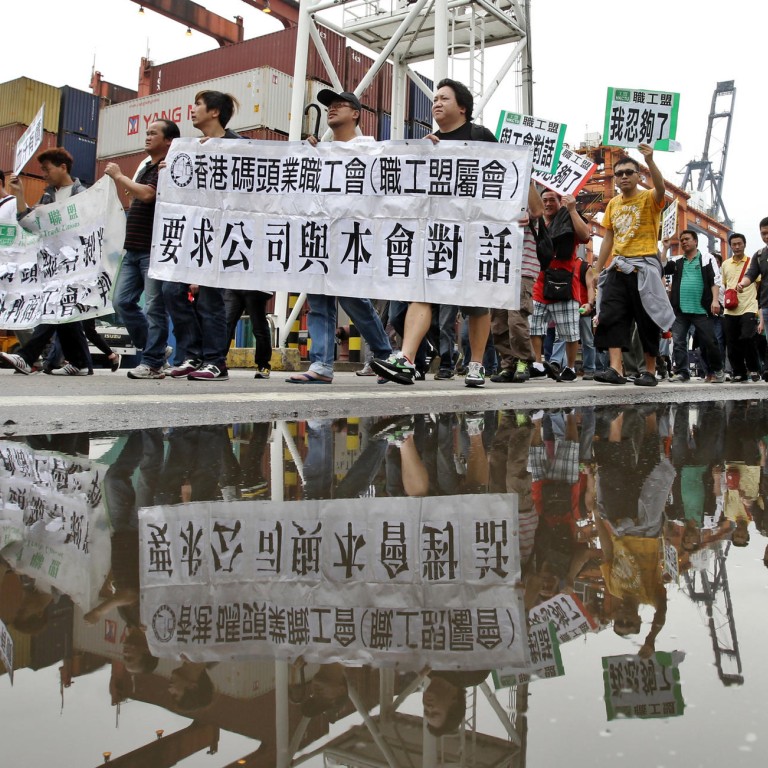
Dockers vow to continue strike
Workers march to the offices of the two main contractors and plead for public help as 100 crane operators show their support
Dock workers vowed to stay on strike until their demands were met, some recalling how they worked at the terminal for as long as seven days without rest.
About 200 strikers continued to block a section of the Kwai Tsing container terminals as their strike entered the second day yesterday. A further 100 crane operators joined them last night.
Some workers had reportedly resumed work after their employer agreed to boost their pay by 10 per cent. But the unionists called this a tactic to divide them.
The strikers and their supporting organisations called on the public to donate tents, food, water, clothes and other materials, and to contribute to a fund to support the strike. The Union of Hong Kong Dockers said yesterday it expected the number of strikers to continue growing.
The workers marched to the offices of the two main contractors - Everbest and Comcheung - at the terminal yesterday, vowing not to give in. The Labour Department sent representatives to help with negotiations.
Striking workers rejected an Everbest offer to talk because the company refused to let union representatives participate. The workers also wanted to talk directly to port operator Hongkong International Terminals.
Wong Pit-loi, who has worked at the terminal for seven years, said employees commonly worked non-stop for days on end. His own record was seven straight days without going home or getting any proper sleep.
"The wage is low, so I have to work more days to make ends meet," he said. "It's ridiculous, when you think about it. Even street cleaners make more than us. But ours is really hard work. The metal bars for securing containers weigh more than 10 pounds [4.5kg]."
It's ridiculous, when you think about it. Even street cleaners make more than us. But ours is really hard work. The metal bars for securing containers weigh more than 10 pounds [4.5kg]
The workers made HK$1,315 for a 24-hour shift in 2011, down from HK$1,456 in 1995. On average they work 15 such shifts a month, and are seeking a 17 per cent pay rise.
Another worker, a Mr Chan, 60, said during typhoons the men had to work continuously at the terminal until the storm passed, even if that took days. The contractor refused to talk whenever the workers raised the issue of working conditions, he said.
A Mr Cheng, who has been in the industry for 22 years, said he had originally made about HK$30,000 a month, but his salary had shrunk by half.
Unionist Stanley Ho Wai-hong said there were about 10,000 people in the industry, and most of them faced the same problem because they were employed by contractors.
"No young people would enter the industry," Ho said. "It's a hard and low-paying job." Many workers came from fishing families, had little education and few career choices, he noted.
He said it was strange that wages remained low despite the shortage of dock workers. Ho hopes the strikers can follow in the footsteps of barbenders, construction workers who won a wage increase after a 36-day strike in 2007.
Everbest and Comcheung could not be reached for comment.
